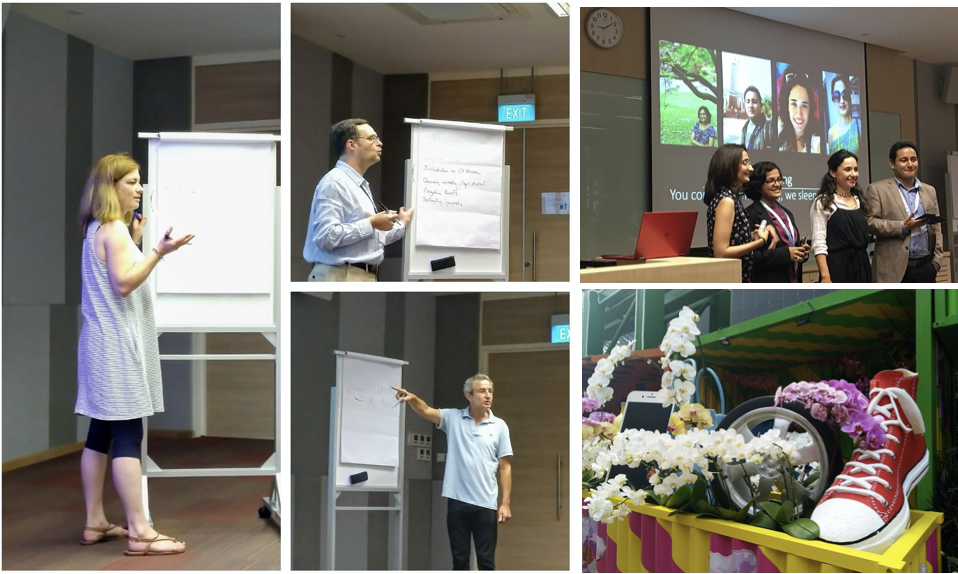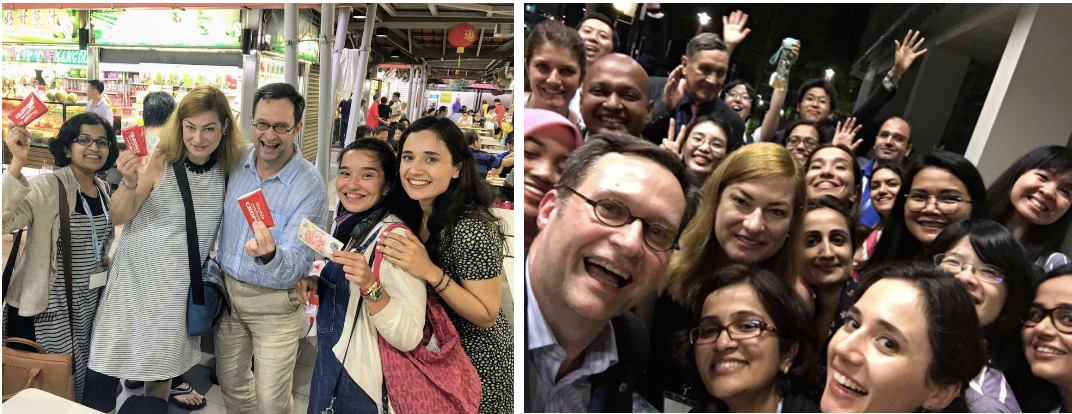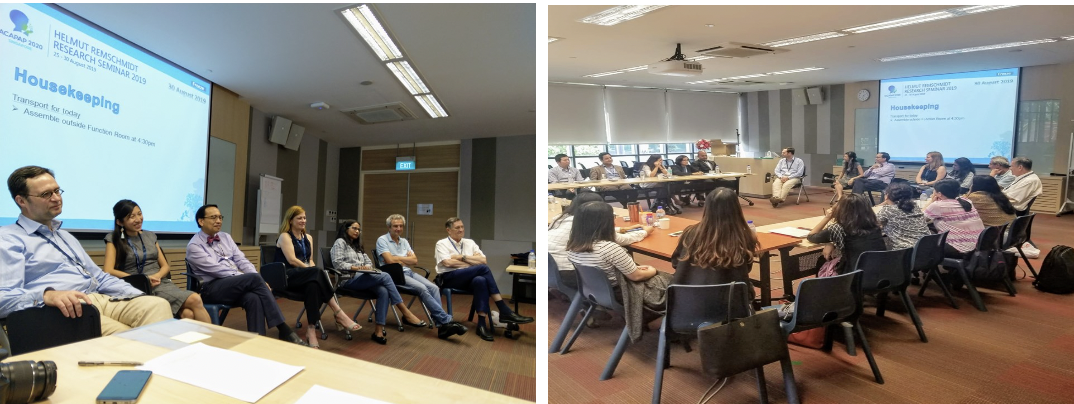7th Helmut Remschmidt Research Seminar 2019: A Personal Journey!
Aisha Sanober Chachar – Pakistan & Lakshmi Sravanti – India
‘Dear fellow,
Thank you for your patience. We would like to inform you that your application has been successful. You have been selected as one of the delegates for the Helmut Remschmidt Research Seminar 2019, which will take place in Singapore on 25 August 2019 to 30 August 2019.’
This is how it all started!
The 7th Helmut Remschmidt Research Seminar (HRRS) in Child and Adolescent Psychiatry took place from 25 – 30 August 2019 in the Institute of Mental Health, Singapore. The theme of this year was ‘Developing Research and Collaborations in Child and Adolescent Psychiatry and Mental Health in Asia.’ For the first time Prof Helmut E. Remschmidt was not able to attend the seminar. However, to infuse the spirit of HRRS, he addressed the fellows virtually. One of the HRRS fellows from Germany, Anne Herr hosted a 30 mins interview with him. It could not have been more comprehensive, and we were glad she took us through his journey very seamlessly.
We were fortunate to have a fantastic panel of mentors, each one of whom was very inspiring in their own unique ways. Hailing from low-and-middle-income countries (LMIC) where research is not at par with the western world, meeting experts from all over the world was exciting and overwhelming at the same time for both of us. This unsaid anxiety was felt among fellow cohort. It was an elephant that no one talked about. What brought first sigh of relief was when Prof Petrus asked how many of us have English as the primary language and only 2-3 hands were raised. This could have been one of the apprehensions for many of us. Addressing it, in the beginning, was reassuring and a sign of a safe learning journey ahead.
The HRRS organizing committee put together an exciting and informative program for the fellows. To break the ice, fellows and mentors were asked to present their professional and personal stories – 2 mins each. This introductory session resulted in loads of laughter and ease. We also got a real sense of who is who, much beyond just knowing each other’s names and professional qualifications. The program was mainly a combination of large-group teaching and small group mentoring. During the week, there were many different opportunities to exchange ideas, insights, and personal experiences with experts and colleagues. There was an immense amount of informal learning within tea breaks and short out-of-the-class conversations with the fellows and mentors. It was evident that “beginner’s struggle” was the hidden curriculum of the training.
It was a pleasure to be seated in the audience listening to the very lucid and candid lectures. The sight got even merrier when our mentors took to the board and used their writing skills to clarify certain concepts and our doubts. Listening to the lived experiences of mentors as beginners and fellow fellows provided hope. For early-career child and adolescent mental health professionals from low and middle-income countries, it was heartening to receive the validation that “I am not alone.” We were given the opportunity of one-on-one mentorship which provided an excellent venue to discuss personal concerns, struggles, and uncertainties with the experts. Throughout these 6 days, while the mentors displayed their wealth of knowledge and expertise in the classroom, they were also full of joy and high on life. A mention should be made of a ‘smart orange juice machine’ strategically placed across the passage that quenched our thirst in tea-breaks.

It was a beautiful blend of more than 15 nationalities under one roof. There was immense trans-cultural learning during the week. It was a fantastic platform where we even asked fundamental questions about some aspects of our lives that we often take for granted and connected with ourselves better. While there were a series of serious sessions going on, there was something that caught our attention every day. It was the caricatures of our mentors appearing on a chalkboard that became the backdrop of our group photos. To our surprise the artist behind the drawings was none other than Dr Daniel Fung. It was not complete without his picture though, and Sravanti was delighted that he let her draw his picture!
The organizers took us on a mini-tour of the Institute of Mental Health (IMH), where friendly people greeted us in different units. From the Ronald McDonald family room, to the hydroponic farm unit, to the Woodbridge museum, all were so appealing that they are etched in our memories. The committee also lined up some informal activities for the whole group. So, we got a chance to experience the flavours of Singapore, quite literally! One cannot forget the taste of ‘matcha’ ice-cream and the texture of the delectable mooncakes of festive season. We let our senses delve into the serenity of ‘gardens’ as we took a stroll by the Bay, where we were pleasantly surprised to find a giant replica of Prof Petrus’s shoe. We also relished every bite of the authentic local cuisine at the ‘Chomp Chomp’ food center in Kampong Glam where we used our ‘Chope’ passes.

HRRS 2019 participants on an experiential tour of Singapore
Before calling it a day, we all dined out at a popular fine-dining destination. Aisha was chosen by the fellows to deliver a thank you speech on behalf of the entire group. Michelle and Aisha quickly came up with a short speech where we acknowledged one trait per mentor: serious-looking cartoon artist, a photographer, a storyteller, a selfie expert, cultural blender, live demo of a key stakeholder, a museum lover who forgot his way to the museum and landed with us at ‘chomp chomp’, wearing sunscreen is essential, research can be sexy and crazy at the same time – phewww!, and a woman who scares the policymakers.
HRRS 2019 provided an exceptional opportunity to interact and learn from experts, make new connections, form friendships, for cross-cultural exchange of ideas and most importantly to be a part of a community which is dedicated to the noble cause of Child and Adolescent Mental Health across the world. Dr. Say How was a wonderful host, and we were moved by the hospitality of the entire organizing team. We collected souvenirs during our trip, and Dr Say How’s personally signed book on ‘navigating through cyber world’ was a unique addition to our collection. The ‘HRRS badge’ will always be one of our most prized possessions. While we go back with a sense of accomplishment and pride, we look forward to staying connected and more importantly take these connections forward to enhance research in our field.

Group Session with Mentors and Fellows

